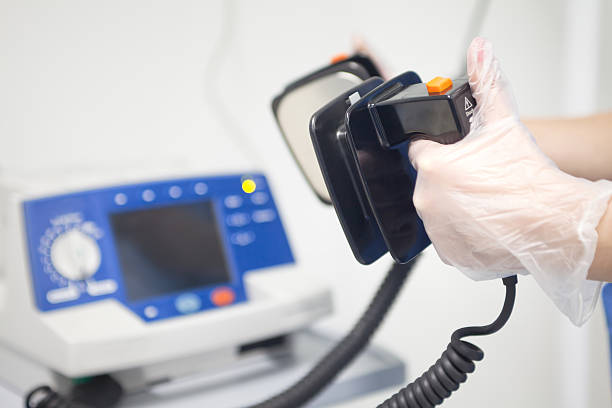The Cardiac Resuscitation Devices Market is projected to expand at a CAGR of 6-7% by 2029.
Increased demand for medical and healthcare services, an increase in the frequency of sudden cardiac arrest, technological advancements, improved awareness and training, an aging population in the population, favorable government initiatives, and an increasing use of these devices in non-traditional settings are some of the factors driving the growth of the cardiopulmonary resuscitation (CPR) devices market.
Cardiopulmonary resuscitation (CPR),
another name for cardiac resuscitation, is an emergency treatment given to
people who are experiencing cardiac arrest—a condition in which the heart stops
beating efficiently—in an emergency. In order to sustain blood flow and
oxygenation to critical organs, especially the brain, until advanced medical
assistance arrives, cardiopulmonary resuscitation (CPR) combines rescue
breathing with chest compressions. Maintaining circulation and oxygenation is
the major objective of CPR until the patient's heart can be restarted or until
more sophisticated medical procedures, including defibrillation, can be
performed.
Get Detailed Insights on Cardiac Resuscitation Devices Market
Report with a Sample PDF @ https://meditechinsights.com/cardiac-resuscitation-devices-market/request-sample/
Cardiac resuscitation devices are tools
designed to assist in the performance of CPR or to provide additional support
during resuscitation efforts. Some common cardiac resuscitation devices
include:
- Automated External Defibrillators (AEDs): These
portable devices analyze the heart rhythm and deliver an electric shock if
necessary to restore normal heart rhythm. AEDs are commonly used in conjunction
with CPR
- Mechanical CPR Devices:
These devices provide automated chest compressions during CPR. They can ensure consistent
and effective chest compressions, especially in challenging situations such as
during transport or in confined spaces
- Airways and Oxygen Delivery Devices:
Devices such as bag-valve masks and advanced airway adjuncts help maintain an
open airway and provide oxygenation during CPR
- Chest Compression Assist Devices: These devices assist rescuers in delivering chest compressions by providing feedback on compression depth and rate, ensuring optimal performance
- Extracorporeal Membrane Oxygenation (ECMO)
Machines: In more advanced cases of cardiac arrest, ECMO machines can
temporarily take over the function of the heart and lungs, providing oxygenated
blood to the body while efforts are made to restore normal heart function
Market
Momentum: Comprehending the Drivers Driving the Expansion of CPR Equipment
In
addition to the rising need for healthcare and medical services as well as the
rising incidence of chronic illnesses, a number of other reasons are driving
the market for cardiopulmonary resuscitation (CPR) devices. The market is
expanding as a result of ongoing innovation in CPR device technology, such as
the creation of automated and portable equipment, which improves CPR's efficacy
and accessibility. The rising demand for CPR devices is being driven by the
increasing public awareness of CPR and the importance of early intervention in
cardiac crises, as well as the widespread implementation of CPR training
efforts. For instance,
- In April 2023, Defibtech unveiled the ARM XR, the latest advancement in their automated CPR device lineup, designed for emergency medical professionals to aid patients in cardiac arrest, aiming to broaden the utilization of automated CPR technology among emergency responders and enhance outcomes for out-of-hospital cardiac arrest cases
An other reason driving
up demand for CPR equipment is the elderly population, which is increasingly
prone to cardiac-related illnesses. Government campaigns and laws requiring the
availability of CPR devices in public areas also fuel industry expansion. The
market is being driven by investments in emergency medical equipment, including
CPR devices, due to the rising cost of healthcare, especially in developing
nations. The market is developing outside of traditional hospital settings
because to the increasing use of CPR equipment in non-traditional contexts such
home care, sports facilities, and public transportation. Last but not least,
the rising prevalence of abrupt cardiac arrests worldwide is increasing demand
for CPR equipment since early CPR intervention greatly increases survival
rates. All things considered, these forces work together to propel the market
for cardiopulmonary resuscitation devices.
Cardiopulmonary Resuscitation Device
Advancements: From Wearable Technology to AI
By quickly restoring circulation and heartbeat
after sudden cardiac arrest (SCA), cardiac resuscitation equipment plays a
critical role in saving lives. Furthermore, wearable cardiac resuscitation
devices provide instantaneous reaction and continuous monitoring, automatically
delivering shocks to restore normal cardiac rhythm as necessary. Experts can
instruct staff on CPR procedures using telemedicine and remote support
platforms, especially in places with limited access to healthcare. In addition,
contemporary gadgets incorporate real-time CPR feedback and integrate with
telemedicine to provide remote monitoring and assistance in case of emergency.
For instance,
- In January 2023, Mindray unveiled the next-generation BeneHeart series defibrillators, the BeneHeart D60 and D30, with a focus on elevating resuscitation standards through enhanced reliability, expert diagnosis and monitoring tools, and a comprehensive quality improvement solution for both in-hospital and pre-hospital-rescue-scenarios
By giving
immediate feedback on the effectiveness of CPR, the integration of artificial
intelligence (AI) and machine learning (ML) has transformed CPR instruction and
support. Improved data gathering and analysis tools let medical professionals
assess the quality of care and improve resuscitation techniques. Wearable CPR
equipment has been made possible by miniaturization, enabling automated CPR
initiation when needed and continuous monitoring. The developments in the
cardiopulmonary resuscitation market represent a noteworthy progression,
augmenting the accessibility, efficacy, and efficiency of CPR. In an effort to
better the prognosis for patients suffering from sudden cardiac arrest in the
face of the rising incidence of cardiovascular illnesses and sudden cardiac
arrests, manufacturers, researchers, and medical professionals are working
together to advance cardiac resuscitation technology.
Examining Regional Trends in the Market for
Cardiac Resuscitation Devices
By adjusting their strategies to particular
market circumstances and target audiences, stakeholders may maximize
development potential and successfully fulfill regional demands with the aid of
an analysis of regional segmentation. Cardiac resuscitation devices are sold in
the following regions: North America, Europe, Asia Pacific, Latin America, the
Middle East, and Africa. North America is anticipated to occupy a sizable
portion of the market due to its sophisticated cardiac resuscitation technology
adoption, strong healthcare infrastructure, high level of CPR knowledge, and
strict regulatory standards. Innovative CPR devices are in high demand due to a
number of variables including an aging population and an increase in cardiac
arrests. Conversely, in the Asia Pacific region, including countries
like China, Japan, and India, the market landscape is influenced by rapid
urbanization, increasing healthcare expenditure, and rising prevalence of
cardiovascular diseases, presenting significant growth opportunities for
Cardiac Resuscitation Devices. The region also witnesses the emergence of
telemedicine and mobile health technologies, which further drive the adoption
of CPR devices.
Competitive Landscape Analysis of the Cardiac
Resuscitation Devices
Organic and Inorganic Growth Strategies
Adopted by Players to Establish Their Foothold in the Market
Players operating in this market are adopting
both organic and inorganic growth strategies such as collaborations, and
acquisitions to garner market share. For instance,
- In April 2023, Nordic Capital acquired a majority share in Corpuls to bolster the company's next growth phase, Corpuls specializes in emergency medical solutions and cardiac resuscitation, particularly in the external defibrillator segment, and is recognized as one of Germany's fastest-growing mid-market companies, attributed to its innovative product portfolio and strong research and development capabilities
- In March 2022, Avive Solutions, Inc., a developer of an intelligent AED and connected response platform for out-of-hospital cardiac arrest (OHCA) emergencies, announced the closure of a $22 million Series A round of financing, co-led by Questa Capital, Catalyst Health Ventures, and repeat investor Laerdal Million Lives Fund
About Medi-Tech Insights
Medi-Tech Insights is a healthcare-focused business research & insights firm. Our clients include Fortune 500 companies, blue-chip investors & hyper-growth start-ups. We have successfully completed 100+ projects in Digital Health, Healthcare IT, Medical Technology, Medical Devices & Pharma Services.
Contact:
Ruta Halde
Associate, Medi-Tech Insights




Comments
Post a Comment